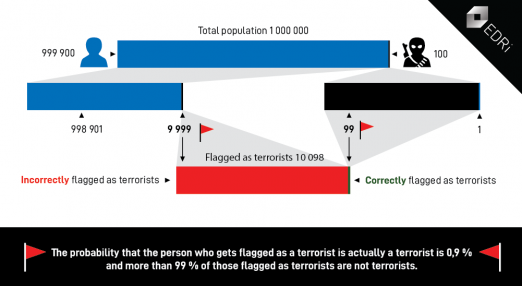Surveillance and data retention
Filter resources
-

“E-evidence”: Repairing the unrepairable
On 11 November 2019, Member of the European Parliament (MEP) Birgit Sippel (S&D), Rapporteur for the Committee on Civil Liberties, Justice and Home Affairs (LIBE) presented her draft Report, attempting to fix the many flaws of the European Commission’s “e-evidence” proposal. Has Sippel MEP been successful at repairing the unrepairable? The initial e-evidence proposal by […]
Read more
-

Danish data retention: Back to normal after major crisis
The Danish police and the Ministry of Justice consider access to electronic communications data to be a crucial tool for investigation and prosecution of criminal offences. Legal requirements for blanket data retention, which originally transposed the EU Data Retention Directive, are still in place in Denmark, despite the judgments from the Court of Justice of […]
Read more
-

Austrian Passenger Name Records complaint – the key points
Austrian EDRi member epicenter.works filed a complaint with the Austrian data protection authority (DPA) about the Passenger Name Records (PNR) in August 2019, with the aim to overturn the EU PNR Directive. On 6 September, the DPA rejected the complaint, which was a good news, because that was the only way to lodge a complaint […]
Read more
-

The sixth attempt to introduce mandatory SIM registration in Romania
A tragic failure by the police to save a teenage girl who was abducted but managed to call the 112 emergency number three times before she was murdered, led to the adoption of a new Emergency Ordinance in Romania. The law introduces several measures to improve the 112 system, one of which is mandatory SIM card registration for all prepaid users. Currently approximately ten million prepaid SIM cards are used in Romania.
Read more
-

EU Commissioners candidates spoke: State of play for digital rights
On 1 November 2019, the new College of European Commissioners – comprising 27 representatives (one from each EU Member State), rather than the usual 28, thanks to Brexit – are scheduled to take their seats for the next five years, led by incoming President-elect, Ursula von der Leyen.
Read more
-

Trilogues on terrorist content: Upload or re-upload filters? Eachy peachy.
On 17 October 2019, the European Parliament, the Council of the European Union (EU) and the European Commission started closed-door negotiations, trilogues, with a view to reaching an early agreement on the Regulation on preventing the dissemination of terrorist content online. The European Parliament improved the text proposed by the European Commission by addressing its […]
Read more
-

PNR complaint advances to the Austrian Federal Administrative Court
On 19 August 2019, Austrian EDRi member epicenter.works lodged a complaint with the Austrian data protection authority (DPA) against the Passenger Name Records (PNR) Directive. After only three weeks, on 6 September, they received the response from the DPA: The complaint was rejected. That sounds negative at first, but is actually good news. The complaint […]
Read more
-

Why EU passenger surveillance fails its purpose
The EU Directive imposing the collection of flyers’ information (Passenger Name Record, PNR) was adopted in April 2016, the same day as the General Data Protection Regulation (GDPR). The collection of PNR data from all flights going in and out of Brussels has a strong impact on the right of privacy of individuals and it […]
Read more
-

Portugal: Data retention complaint reaches the Constitutional Court
September 2019 brought us long-awaited developments regarding the situation of data retention in Portugal. The Justice Ombudsman decided to send the Portuguese data retention law to the Constitutional Court, following the Court of Justice of the European Union’s (CJEU’s) case law on blanket retention of data that lead to invalidation of Directive 2006/24/EC. This decision […]
Read more
-

Diego Naranjo becomes EDRi’s new Head of Policy
European Digital Rights is happy to announce that – following an open recruitment process – Diego Naranjo will step up from his role as Senior Policy Advisor, and start his work as EDRi’s Head of Policy in September 2019.
Read more
-

Your family is none of their business
Today’s children have the most complex digital footprint in human history, with their data being collected by private companies and governments alike.
Read more
-

EU worries over the possibility of losing wiretapping powers
5G telecoms networks could render obsolete the “lawful interception” techniques that police is traditionally using, unless the European Union and national governments take action. This was revealed in internal EU documents obtained by EDRi member Statewatch, that has published a new analysis explaining the issues and calling for a public debate. “It is unsurprising that […]
Read more
